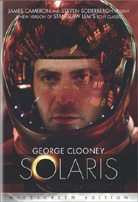Solaris (2002)
| Steven Soderbergh's film of Polish novelist Stanislaw Lem's Solaris was advertised as a romance during its theatrical release, which is not entirely inaccurate, depending on what your definition is of a romantic movie. Solaris is a love story, but it's not exactly a date movie, unless your date is a graduate student in philosophy. Rather, it is a difficult and enigmatic exploration of human affection that makes you ponder more than cry. One can imagine why Twentieth Century-Fox would want to sell it as romance, given that its true nature--that being heady, philosophical science fiction--isn't exactly the kind of stuff that sets the box office on fire. Solaris has, of course, been adapted to the screen before, 30 years earlier to be exact by Soviet auteur Andrei Tarkovsky, who focused on themes of the nature of humanity and ethics in scientific exploration. Soderbergh, whose last film was the intolerably dull "experiment" Full Frontal (2002), doesn't follow Tarkovsky's route, but instead focuses on human relationships, rather than humanity itself. Buried in the story are questions about what is life, which makes the film kin to Steven Spielberg's A.I. Artificial Intelligence (2001), particularly in the way it makes us care about an entity that looks and acts human, but is not. George Clooney, in his third starring role in a Soderbergh film (the previous two being 1998's Out of Sight and 2001's Ocean's Eleven), stars as Chris Kelvin, a psychologist who is sent to a space station orbiting the distant planet Solaris to investigate a strange report. Once there, he finds only two of the three-person crew still alive: the mumbling, spaced-out Snow (Jeremy Davies) and the hyper-paranoid Dr. Helen Gordon (Viola Davis). Something strange has been happening on the station, and it has something to do with the planet, which is much more than it seems. Chris soon learns what has been happening: Solaris is a sentient being that somehow has the ability to read their minds and turn their deepest, guiltiest feelings into material reality. It's different for each person, and Chris' deepest guilt involves the death of his wife, Rheya (Natascha McElhone). Thus, when he wakes up the next morning, he discovers Rheya in his room, slightly confused as to where she is and what has happened. It is not a dream or a hallucination--she has physical presence so that he can touch her, talk to her, make love to her. But, at the same time, it's not really her, but rather a physical incarnation of his memory of her. Yet, for Chris, her presence poses an opportunity to make up for past mistakes, to redeem himself by loving this new Rheya better than he did his actual wife, whose death he blames on himself. One way in which Soderbergh's version of Solaris differs sharply from Tarkovsky's is the intent focus on Chris and Rheya's relationship. Much of Soderbergh's film is composed of flashbacks in which we see them meet, fall in love, get married, and slowly draw away from each other as their relationship disintegrates. In this way, Soderbergh's film is much more about the nature of how people interact in love and stress and sadness. Feelings of guilt and remorse hang heavily over everything, emphasized by Soderbergh's languid camera movements and long takes. If he borrowed anything from Tarkovsky, it is primarily the 1972 film's slow and methodical tone and style, which some may find maddeningly dense and others will find reflective and evocative. Thankfully, Soderbergh did not exploit the new possibilities in special effects to turn the film into a shallow spectacle. Like Tarkovsky, he realizes that science fiction is the backdrop, not the focus, and he gives us only a handful of special-effects shots to depict the space station and the glowing, pulsating Solaris, which shines purplish and blue. Most of the time, we see it only out the space station's windows, which gives the planet a palpable and unceasing presence, but never draws away from the true focus of the story on the characters. George Clooney appears in every scene in the film, thus there is a lot of weight on his shoulders. While a talented and versatile actor, he doesn't quite seem to have the dramatic weight to pull off the complex role of Chris Kelvin, a man in a perpetual state of sadness whose existential gloom is alleviated by a pipe dream of getting to do it all over again. (The rumors that Daniel Day-Lewis turned the role down allows for a tantalizing imagining of what the film might have been like with an actor of true depth, one who would be willing and capable of letting it all hang out.) Soderbergh helps Clooney out all he can visually, particularly in the film's opening scenes on Earth, which are shot with claustrophobic close-ups and dark tones to suggest melancholy and isolation. Natascha McElhone, whom some may remember from her role in The Truman Show (1998), was a perfect casting choice for Rheya, as her unconventionally beautiful face and expressive eyes give her a slightly otherworldly feel. She fits just right into this similarly otherworldly film, which is truly an unconventional love story with an ending that makes you wonder about, rather than revel in, the blissful (or is it bitter?) delusion of romantic yearning.
Copyright © 2002, 2003 James Kendrick | |||||||||||||||||||||||||||||||||||||||||
Overall Rating: 

 (3)
(3)


